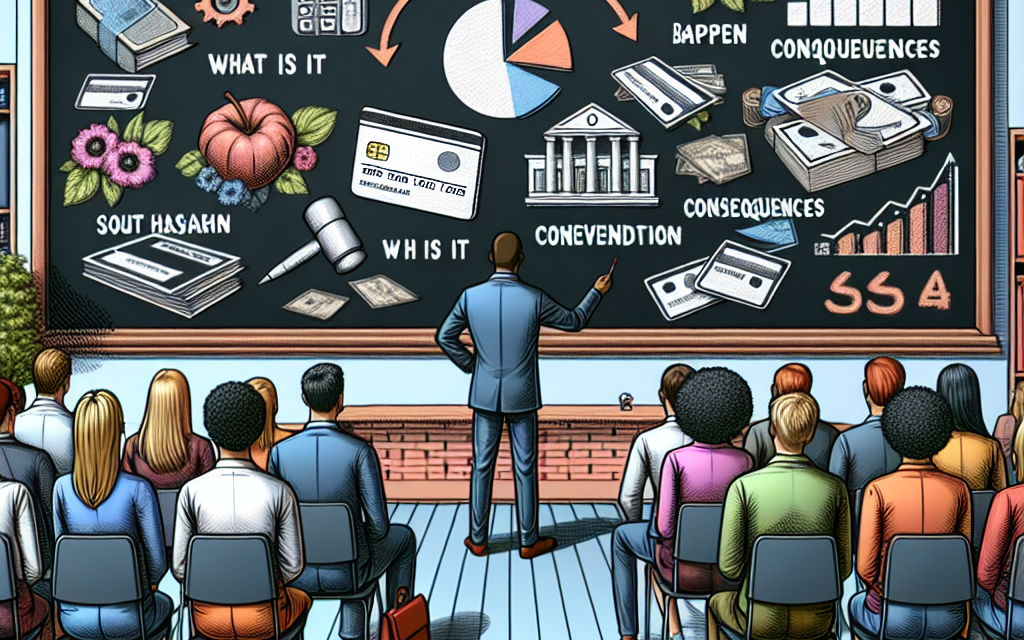“Master Your Finances: Essential Insights on Understanding Credit Card Defaults.”
Introduction
Understanding Credit Card Defaults: Essential Information You Should Know
Credit card defaults occur when a cardholder fails to make the required minimum payments on their credit card account, leading to significant financial repercussions. This phenomenon not only affects the individual’s credit score but can also result in increased interest rates, late fees, and potential legal action from creditors. Understanding the causes and consequences of credit card defaults is crucial for consumers to manage their finances effectively and avoid falling into a cycle of debt. This guide provides essential information on the factors contributing to credit card defaults, the impact on credit ratings, and strategies for prevention and recovery.
Causes Of Credit Card Defaults
Credit card defaults occur when a cardholder fails to make the required minimum payments on their credit card account, leading to significant financial repercussions. Understanding the causes of credit card defaults is crucial for both consumers and financial institutions, as it can help mitigate risks and promote better financial management. One of the primary reasons for credit card defaults is financial hardship, which can stem from various factors such as job loss, medical emergencies, or unexpected expenses. When individuals face sudden changes in their financial circumstances, they may struggle to meet their monthly obligations, including credit card payments. This inability to pay can quickly escalate into a default situation, particularly if the individual has accumulated high levels of debt.
Moreover, poor financial planning and budgeting can also contribute to credit card defaults. Many consumers underestimate their monthly expenses or overestimate their income, leading to a mismatch between their financial capabilities and their spending habits. When individuals rely heavily on credit cards without a clear understanding of their repayment capacity, they may find themselves in a precarious situation. This lack of foresight can result in missed payments, which not only incur late fees but also negatively impact credit scores, further complicating the individual’s financial landscape.
In addition to personal financial mismanagement, the prevalence of high-interest rates on credit cards can exacerbate the risk of default. Credit cards often come with variable interest rates that can increase significantly, especially for those with lower credit scores. As interest accumulates, the total amount owed can become overwhelming, making it increasingly difficult for cardholders to keep up with payments. Consequently, individuals may prioritize other financial obligations over their credit card payments, leading to defaults.
Another contributing factor to credit card defaults is the psychological aspect of credit usage. Many consumers view credit cards as a means to access immediate funds, which can lead to impulsive spending behaviors. This tendency to overspend can create a cycle of debt that becomes unmanageable over time. When individuals fail to recognize the long-term implications of their spending habits, they may find themselves unable to meet their financial commitments, resulting in defaults.
Additionally, the economic environment plays a significant role in influencing credit card defaults. During periods of economic downturn or recession, consumers may experience reduced income or job instability, which can lead to increased defaults. In such circumstances, even individuals who previously managed their credit responsibly may find themselves unable to maintain their payment schedules. This highlights the interconnectedness of individual financial health and broader economic conditions.
Furthermore, the lack of financial literacy can also be a significant factor in credit card defaults. Many consumers are not adequately educated about the implications of credit card usage, including the importance of making timely payments and understanding interest rates. This gap in knowledge can lead to poor decision-making and ultimately result in defaults. Financial education initiatives can play a vital role in equipping consumers with the necessary skills to manage their credit effectively.
In conclusion, credit card defaults are often the result of a combination of personal financial challenges, poor budgeting practices, high-interest rates, impulsive spending behaviors, economic conditions, and a lack of financial literacy. By understanding these causes, consumers can take proactive steps to manage their credit responsibly, while financial institutions can develop strategies to support their clients in avoiding defaults. Ultimately, fostering a culture of financial awareness and responsibility is essential for reducing the incidence of credit card defaults and promoting overall financial well-being.
Impact Of Credit Card Defaults On Credit Score
Understanding the impact of credit card defaults on an individual’s credit score is crucial for anyone navigating the complexities of personal finance. When a borrower fails to make timely payments on their credit card, it can lead to a default, which is typically defined as being 180 days past due. This event not only affects the immediate financial situation of the borrower but also has long-lasting repercussions on their creditworthiness.
To begin with, it is essential to recognize that credit scores are calculated based on several factors, with payment history being one of the most significant. In fact, payment history accounts for approximately 35% of a FICO score, which is one of the most widely used credit scoring models. Consequently, a default can severely damage this aspect of a credit score, leading to a substantial decrease. This decline can be particularly alarming for individuals who may have previously maintained a good credit score, as the effects of a default can linger for years.
Moreover, the repercussions of a credit card default extend beyond just the immediate drop in credit score. Once a default occurs, it is reported to the credit bureaus, and this negative mark can remain on a credit report for up to seven years. During this time, individuals may find it increasingly difficult to secure new credit, as lenders often view a default as a sign of financial irresponsibility or instability. This can lead to higher interest rates on any future loans or credit cards, as lenders may perceive the borrower as a higher risk.
In addition to affecting the ability to obtain new credit, a default can also impact existing financial relationships. For instance, individuals may face increased scrutiny from lenders when applying for mortgages or auto loans. In some cases, they may even be denied credit altogether, which can hinder their ability to make significant purchases or investments. Furthermore, landlords and insurance companies may also consider credit scores when making decisions, potentially leading to challenges in securing housing or favorable insurance rates.
Transitioning from the immediate effects of a default, it is important to consider the psychological impact as well. The stress and anxiety associated with financial difficulties can be overwhelming, and the knowledge that a credit card default can have such far-reaching consequences may exacerbate these feelings. Individuals may experience a sense of shame or embarrassment, which can further complicate their financial recovery. It is vital for those facing defaults to seek support, whether through financial counseling or support groups, to help navigate these challenges.
Fortunately, there are steps that individuals can take to mitigate the damage caused by a credit card default. For instance, making consistent, on-time payments moving forward can gradually improve a credit score over time. Additionally, individuals can consider working with creditors to negotiate payment plans or settlements, which may help to alleviate some of the financial burden and potentially lessen the impact on their credit report.
In conclusion, understanding the impact of credit card defaults on credit scores is essential for anyone looking to maintain or improve their financial health. The immediate consequences of a default can be severe, affecting not only credit scores but also future borrowing opportunities and overall financial stability. By taking proactive steps and seeking support, individuals can work towards recovery and rebuild their creditworthiness over time.
Strategies To Avoid Credit Card Defaults
Understanding credit card defaults is crucial for maintaining financial health, and one of the most effective ways to prevent such defaults is to implement strategic measures. First and foremost, creating a comprehensive budget is essential. A well-structured budget allows individuals to track their income and expenses, ensuring that they allocate sufficient funds for credit card payments. By understanding their financial landscape, consumers can prioritize their spending and avoid overspending, which is often a precursor to defaulting on credit card obligations.
In addition to budgeting, it is vital to establish an emergency fund. Life is unpredictable, and unexpected expenses can arise at any moment. Having a financial cushion can provide peace of mind and prevent the need to rely on credit cards during emergencies. Ideally, this fund should cover three to six months’ worth of living expenses, allowing individuals to manage unforeseen circumstances without jeopardizing their credit card payments.
Moreover, consumers should consider setting up automatic payments for their credit cards. This strategy ensures that payments are made on time, reducing the risk of late fees and negative impacts on credit scores. By automating payments, individuals can also avoid the stress of remembering due dates, which can be particularly beneficial for those with busy schedules. However, it is important to ensure that sufficient funds are available in the bank account to cover these automatic withdrawals, as overdrafts can lead to additional fees and complications.
Another effective strategy is to monitor credit card usage closely. Keeping track of spending habits can help individuals identify patterns that may lead to overspending. By regularly reviewing statements and utilizing budgeting apps, consumers can gain insights into their financial behavior and make necessary adjustments. This proactive approach not only aids in avoiding defaults but also fosters a greater understanding of personal finance.
Furthermore, it is advisable to limit the number of credit cards in use. While having multiple credit cards can provide benefits such as rewards and increased credit limits, it can also lead to confusion and difficulty managing payments. By consolidating credit card accounts, individuals can simplify their financial obligations and reduce the likelihood of missing payments. Additionally, maintaining a lower credit utilization ratio—ideally below 30%—can positively impact credit scores and enhance financial stability.
In cases where individuals find themselves struggling to make payments, seeking assistance is crucial. Many financial institutions offer hardship programs that can provide temporary relief, such as reduced interest rates or extended payment terms. Engaging with creditors early on can demonstrate a willingness to address the situation, which may lead to more favorable outcomes. Additionally, consulting with a financial advisor or credit counselor can provide valuable insights and strategies tailored to individual circumstances.
Lastly, educating oneself about credit card terms and conditions is paramount. Understanding interest rates, fees, and payment schedules can empower consumers to make informed decisions regarding their credit usage. By being aware of the implications of their financial choices, individuals can navigate the complexities of credit cards more effectively and avoid pitfalls that may lead to defaults.
In conclusion, avoiding credit card defaults requires a multifaceted approach that includes budgeting, establishing an emergency fund, automating payments, monitoring spending, limiting credit card usage, seeking assistance when needed, and educating oneself about credit terms. By implementing these strategies, individuals can enhance their financial well-being and maintain a healthy relationship with credit.
Consequences Of Defaulting On A Credit Card
Defaulting on a credit card can have significant and far-reaching consequences that extend beyond immediate financial distress. When a cardholder fails to make the required payments on their credit card account, typically after a period of 180 days of non-payment, the account is considered to be in default. This situation triggers a series of repercussions that can impact various aspects of an individual’s financial life.
One of the most immediate consequences of defaulting on a credit card is the negative effect on the cardholder’s credit score. Credit scores are calculated based on several factors, including payment history, credit utilization, and the length of credit history. A missed payment can lead to a drop in the credit score, which can hinder the ability to secure future loans or credit. In fact, a lower credit score can result in higher interest rates on any new credit, as lenders perceive the individual as a higher risk. This can create a cycle of financial strain, making it increasingly difficult to manage existing debts or obtain new credit.
In addition to the impact on credit scores, defaulting on a credit card can lead to increased financial penalties. Credit card companies often impose late fees and may raise the interest rate on the outstanding balance, compounding the debt. As the balance grows due to these additional charges, the cardholder may find themselves in a precarious financial situation, struggling to keep up with payments. Furthermore, if the account remains in default for an extended period, the credit card issuer may choose to send the debt to a collection agency. This transition can escalate the situation, as collection agencies often employ aggressive tactics to recover the owed amount, which can add further stress to the cardholder.
Moreover, defaulting on a credit card can have legal implications. If the debt remains unpaid, creditors may pursue legal action to recover the funds. This could result in a court judgment against the cardholder, leading to wage garnishment or bank account levies. Such legal actions not only exacerbate financial difficulties but can also create a lasting record that may affect future employment opportunities, as some employers conduct credit checks as part of their hiring process.
Another consequence of credit card default is the potential for loss of access to credit. Once an account is in default, the credit card issuer may close the account, preventing the cardholder from using the card for future purchases. This loss of credit access can be particularly detrimental in emergencies when immediate funds are needed. Additionally, the default may lead to the cancellation of other credit accounts, as lenders often review the creditworthiness of their customers periodically.
In light of these consequences, it is crucial for individuals to understand the importance of managing their credit responsibly. Proactive measures, such as setting up automatic payments or creating a budget, can help prevent defaults from occurring. If a cardholder finds themselves struggling to make payments, it is advisable to communicate with the credit card issuer to explore options such as payment plans or hardship programs. By taking these steps, individuals can mitigate the risks associated with credit card defaults and maintain their financial health. Ultimately, understanding the consequences of defaulting on a credit card is essential for making informed financial decisions and safeguarding one’s creditworthiness.
How To Recover From A Credit Card Default
Recovering from a credit card default can be a challenging yet essential process for regaining financial stability and restoring one’s creditworthiness. The first step in this journey is to acknowledge the default and understand its implications. A credit card default typically occurs when a borrower fails to make the required payments for an extended period, often leading to significant damage to their credit score. This damage can hinder future borrowing opportunities and increase the cost of credit. Therefore, addressing the situation promptly is crucial.
Once the default is recognized, the next step involves assessing the overall financial situation. This assessment should include a thorough review of income, expenses, and existing debts. By creating a detailed budget, individuals can identify areas where they can cut back on spending, thereby freeing up funds to allocate towards debt repayment. This proactive approach not only helps in managing current financial obligations but also instills a sense of control over one’s financial future.
After establishing a budget, it is advisable to communicate with the credit card issuer. Many lenders are willing to work with borrowers who demonstrate a genuine effort to resolve their debts. By reaching out to the creditor, individuals can explore options such as payment plans, reduced interest rates, or even debt settlement. Open communication can often lead to more favorable terms, making it easier to manage repayments and ultimately recover from the default.
In addition to negotiating with creditors, individuals should also consider enrolling in a credit counseling program. These programs, offered by nonprofit organizations, provide valuable resources and guidance for managing debt. Credit counselors can assist in creating a personalized repayment plan, offer financial education, and help individuals navigate the complexities of credit management. Engaging with a credit counselor can be particularly beneficial, as they can provide insights and strategies that may not have been previously considered.
As individuals begin to make progress in repaying their debts, it is essential to focus on rebuilding credit. One effective way to do this is by obtaining a secured credit card. Unlike traditional credit cards, secured cards require a cash deposit that serves as collateral. This arrangement allows individuals to rebuild their credit history while minimizing the risk of further defaults. By making timely payments on a secured card, borrowers can gradually improve their credit scores, demonstrating their commitment to responsible credit use.
Moreover, it is crucial to monitor credit reports regularly. Individuals are entitled to one free credit report per year from each of the three major credit bureaus. By reviewing these reports, borrowers can identify any inaccuracies or discrepancies that may negatively impact their credit scores. If errors are found, it is important to dispute them promptly, as correcting inaccuracies can lead to a more favorable credit profile.
Finally, patience and persistence are key components of recovering from a credit card default. The process of rebuilding credit and regaining financial stability takes time, but with consistent effort and a commitment to responsible financial practices, individuals can overcome the challenges posed by a default. By taking proactive steps, seeking assistance when needed, and maintaining a focus on long-term financial health, it is possible to emerge from the experience with a stronger understanding of credit management and a renewed sense of financial security. Ultimately, recovery from a credit card default is not just about repairing credit; it is about fostering a healthier relationship with money and ensuring a more secure financial future.
Legal Rights And Responsibilities In Credit Card Defaults
When navigating the complex landscape of credit card defaults, it is crucial to understand the legal rights and responsibilities that both consumers and creditors hold. A credit card default occurs when a cardholder fails to make the required minimum payments on their credit card account, typically for a period of 180 days. This situation can lead to significant financial repercussions, including damage to one’s credit score, increased interest rates, and potential legal action from creditors. Therefore, being informed about the legal framework surrounding credit card defaults is essential for anyone who finds themselves in this predicament.
Firstly, it is important to recognize that consumers have specific rights under the Fair Debt Collection Practices Act (FDCPA). This federal law protects consumers from abusive debt collection practices and ensures that they are treated fairly. For instance, debt collectors are prohibited from using deceptive or harassing tactics to collect debts. If a consumer believes that a collector is violating these rights, they can file a complaint with the Federal Trade Commission (FTC) or take legal action against the collector. Understanding these protections can empower consumers to stand up against unfair practices and seek redress when necessary.
Moreover, consumers are entitled to receive clear and accurate information regarding their debts. Creditors must provide a written notice detailing the amount owed, the name of the creditor, and the consumer’s rights to dispute the debt. This transparency is vital, as it allows consumers to verify the legitimacy of the debt and understand their obligations. If a consumer disputes a debt, the creditor is required to investigate the claim and provide evidence of the debt’s validity. This process underscores the importance of maintaining accurate records and communication with creditors.
On the other hand, consumers also have responsibilities when it comes to managing their credit card accounts. It is essential to make timely payments and communicate with creditors if financial difficulties arise. Many creditors offer hardship programs or payment plans for those facing temporary financial challenges. By proactively reaching out to creditors, consumers may be able to negotiate more favorable terms, such as lower interest rates or extended payment deadlines. This proactive approach can help mitigate the consequences of default and preserve the consumer’s credit standing.
In addition to understanding rights and responsibilities, it is also important to be aware of the potential legal actions that creditors may pursue in the event of a default. If a debt remains unpaid, creditors may choose to file a lawsuit to recover the owed amount. If a judgment is obtained against the consumer, it can lead to wage garnishment or bank account levies, further complicating the individual’s financial situation. Therefore, it is advisable for consumers to respond promptly to any legal notices and seek legal counsel if necessary. Engaging with a qualified attorney can provide valuable guidance on how to navigate the legal system and protect one’s rights.
In conclusion, understanding the legal rights and responsibilities associated with credit card defaults is essential for consumers facing financial difficulties. By being informed about protections under the FDCPA, maintaining open communication with creditors, and recognizing the potential legal ramifications of default, individuals can better navigate their financial challenges. Ultimately, knowledge is a powerful tool that can help consumers make informed decisions and take proactive steps toward financial recovery.
The Role Of Credit Counseling In Preventing Defaults
Credit card defaults can have significant repercussions for individuals, affecting their credit scores and financial stability. One effective strategy for preventing defaults is credit counseling, a service designed to assist consumers in managing their debts and improving their financial literacy. By understanding the role of credit counseling, individuals can better navigate their financial challenges and avoid the pitfalls associated with defaulting on credit card payments.
Credit counseling typically begins with a comprehensive assessment of an individual’s financial situation. During this initial consultation, a credit counselor reviews the client’s income, expenses, debts, and overall financial goals. This thorough evaluation allows the counselor to identify specific areas where the client may be struggling and to develop a tailored plan to address these issues. By gaining a clear understanding of their financial landscape, clients can make informed decisions about their spending habits and debt management strategies.
One of the primary benefits of credit counseling is the education it provides. Many individuals lack a solid understanding of how credit works, including the implications of high-interest rates and the importance of timely payments. Through counseling sessions, clients learn about budgeting techniques, debt repayment strategies, and the significance of maintaining a good credit score. This knowledge empowers individuals to take control of their finances, reducing the likelihood of falling into default.
Moreover, credit counseling can facilitate the development of a debt management plan (DMP). A DMP is a structured repayment plan that consolidates an individual’s debts into a single monthly payment, often at a reduced interest rate. By enrolling in a DMP, clients can simplify their financial obligations and make consistent payments toward their debts. This structured approach not only helps prevent defaults but also fosters a sense of accountability, as clients are more likely to adhere to a set repayment schedule.
In addition to providing education and creating DMPs, credit counseling services often negotiate with creditors on behalf of their clients. These negotiations can lead to more favorable terms, such as lower interest rates or waived fees, making it easier for individuals to manage their debts. When creditors see that a client is actively seeking help through credit counseling, they may be more willing to cooperate, recognizing the client’s commitment to resolving their financial issues. This collaborative approach can significantly reduce the risk of default.
Furthermore, credit counseling can also address underlying issues that contribute to financial distress. Many individuals face challenges such as job loss, medical emergencies, or unexpected expenses that can strain their budgets. Credit counselors are trained to help clients navigate these difficult situations, offering guidance on how to prioritize expenses and find additional resources. By addressing these root causes, clients are better equipped to avoid defaults and maintain their financial health.
In conclusion, credit counseling plays a vital role in preventing credit card defaults by providing education, creating structured repayment plans, negotiating with creditors, and addressing underlying financial issues. By seeking the assistance of a credit counselor, individuals can gain valuable insights into their financial situations and develop effective strategies to manage their debts. Ultimately, this proactive approach not only helps prevent defaults but also fosters long-term financial stability and peace of mind. As individuals become more informed and empowered, they are better positioned to navigate the complexities of credit and make sound financial decisions.
Q&A
1. **What is a credit card default?**
A credit card default occurs when a cardholder fails to make the minimum required payment on their credit card for a specified period, typically 180 days.
2. **What are the consequences of defaulting on a credit card?**
Consequences include damage to credit score, increased interest rates, potential legal action, and the account being sent to collections.
3. **How does a credit card default affect your credit score?**
A default can significantly lower your credit score, making it harder to obtain new credit and resulting in higher interest rates on future loans.
4. **Can you recover from a credit card default?**
Yes, recovery is possible through consistent on-time payments, reducing debt, and monitoring your credit report to ensure accuracy.
5. **What steps can you take to avoid defaulting on a credit card?**
To avoid default, create a budget, set up automatic payments, communicate with your lender if you’re struggling, and prioritize paying off high-interest debt.
6. **What options are available if you are at risk of defaulting?**
Options include negotiating a payment plan with the credit card issuer, seeking credit counseling, or considering debt consolidation.
7. **How long does a default stay on your credit report?**
A credit card default can remain on your credit report for up to seven years, impacting your ability to secure new credit during that time.
Conclusion
Understanding credit card defaults is crucial for managing personal finances effectively. It involves recognizing the factors that lead to defaults, such as high debt-to-income ratios, lack of financial literacy, and unexpected life events. Awareness of the consequences, including damage to credit scores and potential legal actions, is essential for consumers. By educating oneself on responsible credit use, monitoring credit reports, and seeking assistance when needed, individuals can mitigate the risk of default and maintain financial stability. Ultimately, proactive management of credit card usage is key to avoiding defaults and ensuring long-term financial health.





